Page path:
- INTERCOAST
- Education
- Annual INTERCOAST Workshops
- The 4th Annual INTERCOAST Workshop took place in Hamilton, New Zealand
The 4th Annual INTERCOAST Workshop took place in Hamilton, New Zealand
Introduction to INTERCOAST and to coastal and shelf-sea settings in New Zealand
The 2013 INTERCOAST workshop convened successfully from the 18th to 28th February, 2013, at institutions located in Tauranga and Hamilton in New Zealand. The annual INTERCOAST workshop provided an opportunity for 21 PhD students, their respective project leaders (supervisors), and Post-Docs from Germany and New Zealand alike to come together and reflect on past and present research efforts, and to develop new research ideas and projects in the framework of the INTERCOAST programme. The workshop commenced with a welcoming ceremony at the scenic and inspiring Sulphur Point in Tauranga Harbour, where welcoming speeches were given by Maori representatives, the German ambassador to New Zealand and New Zealand government officials, while the main body of the workshop was held at the University of Waikato campuses in Hamilton and Tauranga.
This 4th annual workshop represented the kick-off workshop for the second and first cohort of highly motivated PhD students from the University of Bremen and the University of Waikato, respectively. The second cohort of University of Bremen PhD students, who just started their thesis work in late 2012 or the beginning of 2013, gave presentations on their respective research backgrounds and then described the basis for their new research projects within the INTERCOAST programme. Despite their ‘green’ PhD status, the 2nd cohort students thoroughly impressed the audience with their superior grasp and understanding of their research topics, which provided an excellent basis for discussing the next steps for their upcoming research with their thesis committees.
For the first cohort of University of Waikato PhD students, who are now entering the home‑stretch of their projects and aiming for completion around the end of 2013, this was their 3rd and final workshop. Students from this group presented the findings from their latest field trips and sketched their final conclusions, which foreshadowed their completed works to come. While the supervisors used these presentations as a basis for fine-tuning the final research work of their students to maximise their contribution to the international body of knowledge, the new students had the chance to anticipate and understand what type of experts they can become three years from now.
This 4th annual workshop represented the kick-off workshop for the second and first cohort of highly motivated PhD students from the University of Bremen and the University of Waikato, respectively. The second cohort of University of Bremen PhD students, who just started their thesis work in late 2012 or the beginning of 2013, gave presentations on their respective research backgrounds and then described the basis for their new research projects within the INTERCOAST programme. Despite their ‘green’ PhD status, the 2nd cohort students thoroughly impressed the audience with their superior grasp and understanding of their research topics, which provided an excellent basis for discussing the next steps for their upcoming research with their thesis committees.
For the first cohort of University of Waikato PhD students, who are now entering the home‑stretch of their projects and aiming for completion around the end of 2013, this was their 3rd and final workshop. Students from this group presented the findings from their latest field trips and sketched their final conclusions, which foreshadowed their completed works to come. While the supervisors used these presentations as a basis for fine-tuning the final research work of their students to maximise their contribution to the international body of knowledge, the new students had the chance to anticipate and understand what type of experts they can become three years from now.
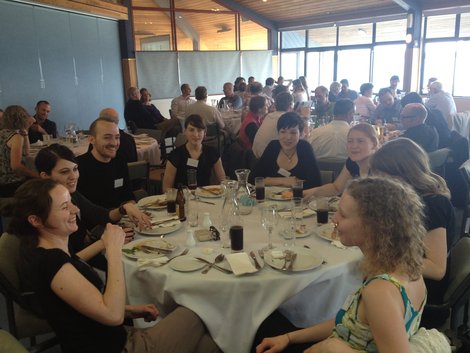
Kick-off workshop dinner hosted by the University of Waikato at Sulfur Point on the Bay of Plenty coast.
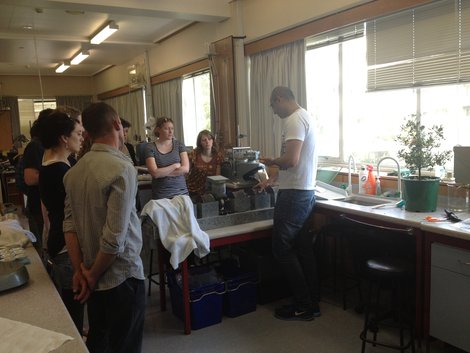
New INTERCOAST PhD students on a tour of the University of Waikato lab facilities.
Thesis committee meetings constituted another essential part of the workshop. For all students, these meetings are central milestones for their research work because they have the opportunity to efficiently discuss their past and future progress directly with both their Bremen and Waikato supervisors. For the new students particularly, committee meetings involved preparation for their much anticipated research stay in New Zealand approximately one year from now by introducing them to the national and local research environment and conditions, the substantial research needs and expectations, and the scientific network by, for example, inviting useful expertise and potential collaboration partners to the meetings. For the experienced cohort, it was also important to discuss their prospective research career after concluding their INTERCOAST term.
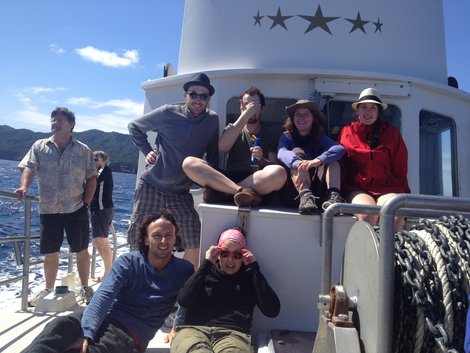
INTERCOAST field trip to Mayor Island in the Bay of Plenty.
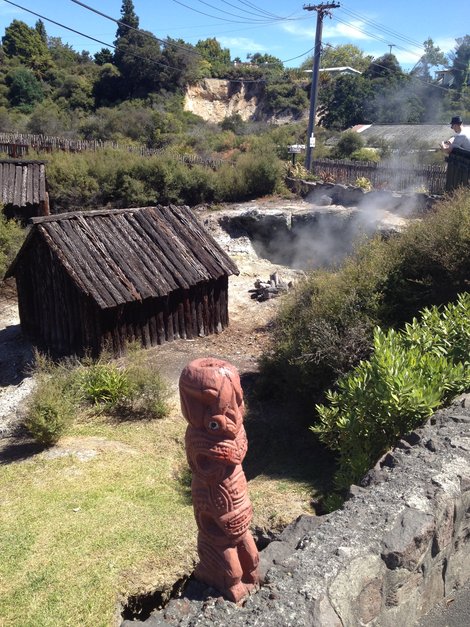
Traditional Maori village Whakarewarewa in Rotorua, New Zealand.
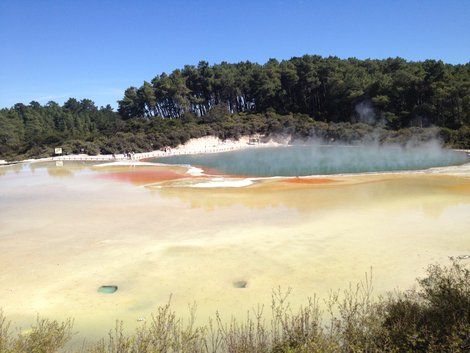
Vibrant colours of a mineral pool at Wai-O-Tapu Reserve.
Besides keeping one another abreast of current work, the project leaders used the workshop to put their heads together and devise strategies for the future development of the INTERCOAST vision and scope.
Occasional and very valuable field trips complemented the scientific work by allowing students to gain insights into the natural and cultural setting in which they will conduct their projects during their research stay in New Zealand.
The first scheduled fieldtrip was a visit to Mayor Island, a small dormant volcanic island lying 25 kilometres off the coast at Tauranga. After an intriguing land-based lecture about the geology, biology, and the conservation efforts by the Department of Conservation (DOC) on the island, participants enjoyed a 3 hour boat ride to the island. Upon arrival, the participants of the workshop were stunned by the rich and dense local flora and fauna occurring on the island, which they could discover either by hiking through the bush along the rim of the volcano or by snorkeling along the coastline. Today, the island and part of its surrounding waters serve as an important nature reserve for native wildlife, particularly bird species and vegetation. The island is cared for by the traditional Maori title holders and very few people have the privilege of visiting the island each day.
Another excursion took the students to the geothermal area surrounding Rotorua. The first part of the excursion was devoted to a visit to the traditional Maori village Whakarewarewa (reduced version for the village’s full title of Whakarewarewatanga-O-Te-Ope-Taua-A-Wahiao). There, the students learned about the cultural values and rites of Maori and their respect for and use of the environment, particularly the heated mineral springs resulting from the underlying geothermal activity. Everyone was particularly amazed by the customs of the local people who cook their corn in a 200 m deep pool of an alkaline chloride hot spring. To top this experience, the second part of the field trip took the students to the Wai-O-Tapu Reserve, a scenic geothermal area known for its many vibrantly coloured mineral pools resulting from mineral accumulations over eons. The cherry on top was a swim in a nearby pool where a cold and a hot stream converged allowing swimmers to find their perfect temperature.
Occasional and very valuable field trips complemented the scientific work by allowing students to gain insights into the natural and cultural setting in which they will conduct their projects during their research stay in New Zealand.
The first scheduled fieldtrip was a visit to Mayor Island, a small dormant volcanic island lying 25 kilometres off the coast at Tauranga. After an intriguing land-based lecture about the geology, biology, and the conservation efforts by the Department of Conservation (DOC) on the island, participants enjoyed a 3 hour boat ride to the island. Upon arrival, the participants of the workshop were stunned by the rich and dense local flora and fauna occurring on the island, which they could discover either by hiking through the bush along the rim of the volcano or by snorkeling along the coastline. Today, the island and part of its surrounding waters serve as an important nature reserve for native wildlife, particularly bird species and vegetation. The island is cared for by the traditional Maori title holders and very few people have the privilege of visiting the island each day.
Another excursion took the students to the geothermal area surrounding Rotorua. The first part of the excursion was devoted to a visit to the traditional Maori village Whakarewarewa (reduced version for the village’s full title of Whakarewarewatanga-O-Te-Ope-Taua-A-Wahiao). There, the students learned about the cultural values and rites of Maori and their respect for and use of the environment, particularly the heated mineral springs resulting from the underlying geothermal activity. Everyone was particularly amazed by the customs of the local people who cook their corn in a 200 m deep pool of an alkaline chloride hot spring. To top this experience, the second part of the field trip took the students to the Wai-O-Tapu Reserve, a scenic geothermal area known for its many vibrantly coloured mineral pools resulting from mineral accumulations over eons. The cherry on top was a swim in a nearby pool where a cold and a hot stream converged allowing swimmers to find their perfect temperature.
In summary, there were many lessons learned and experiences gained. The new students became acquainted with their respective working institutions and supervisors, the national scientific network, the field and research sites, the local people, and the research environment in general, thereby creating a solid basis for commencing their prospective research once they return for their research stay. The experienced students received their concluding directions to finish their research work. Everyone formed and strengthened collaborations and networks for ongoing or future projects. Altogether, this year’s workshop was a great success, and everyone is highly grateful for this unique opportunity and eager to start, continue, or finalise their research work, which forms the foundation for an ongoing and successful collaboration between the University of Bremen, the University of Waikato and the INTERCOAST graduate programme.

Invited Guests
- The German Ambassador Dr Anne-Marie Schleich
- John Cronin (CEO Bay of Plenty Regional Council)
- Tony Reynish (Port Company CEO)
- Andrew Cocker (Priority One CEO)
- Bruce Clarkson (Dean Science and Engineering University of Waikato)

Guest Speakers
| Al Gillespie (Uni Waikato) | Welcome of the New INTERCOAST students |
| David Schiel (Uni Canterbury, NZ) | Reversal of eutrophication and cataclysmic, earthquake-driven changes to an estuarine ecosystem in southern New Zealand |
| Alan Orpin (NIWA, Wellington, NZ) | Floods, ocean storms and stratigraphic variability over a year-long experiment on the muddy and energetic Waipaoa River |
| Paul Kench (Uni of Auckland, NZ) | Climate variability, geomorphology and management of south Pacific atolls |
| Melissa Foley (Stanford Uni, US) | Applying the natural, social, and physical sciences to inform ocean and coastal management |
| Dave Lowe (NZ Government) | Welcome by the New Zealand-German science coordinato |

Public Lectures at the Sulfur's Point Tauranga (18th and 28th Feb 2013)
| Kai Bischof (Uni Bremen) | In a submersed garden: Seaweeds...or just weeds? |
| David Lowe (Uni Waikato) | Polynesian settlement of Aoteroa |

Expert / Soft Skill Courses
| Willem de Lange (Uni Waikato) | Geology of New Zealand |
| Tilo v. Dobeneck (Uni Bremen) | Magnetic mineral markers in the Bay of Plenty, new results and insights |
| Conrad Pilditch (Uni Waikato) | Muddying the waters: sediment inputs and shifts in estuary ecosystem function |
| Karin Bryan (Uni Waikato) | Writing a Paper, Laws of Motion, and Introduction to the University of Waikato Graduate Programme |


